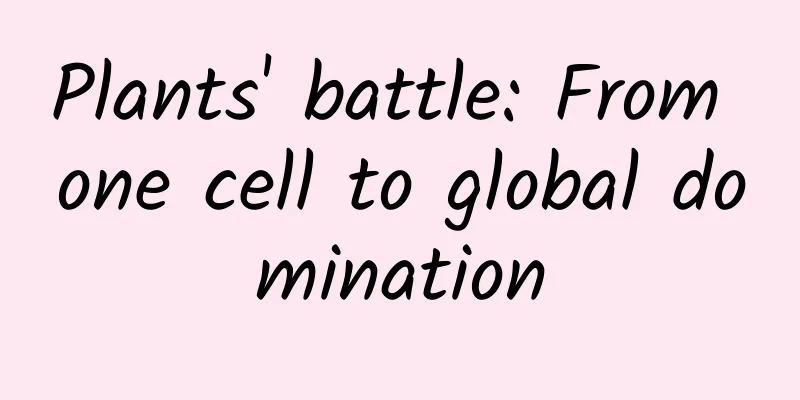Plants' battle: From one cell to global domination

|
Recently, the BBC's latest masterpiece "Green Planet" has once again received widespread acclaim, and the plant world captured by the camera is eye-opening. While the audience's curiosity is satisfied, they feel that their understanding of plants is also rapidly approaching that of plant experts. Then, please try the following 10 questions to see if you are really qualified to be a plant expert: Quiz: How much do you know about plants? (Please see the answer at the end of the article) What is the most powerful creature on earth? It’s not a human being, it’s not a beast, it’s not a giant in the sea, it’s a plant! Their lives seem quiet and low-key. In fact, it is as fierce as the animal world... The lake, which appears calm on the surface, is a battlefield for aquatic plants. Amazonian water lilies wave their new buds and crush their competitors with great force. In order to survive, the rainbow river moss, which looks like a cherry blossom forest, uses all kinds of tricks. Its stems secrete the most powerful adhesive in nature and adhere to rocks. The tropical rain forest is even more of an interconnected battlefield. Rainbow River Moss/Photo source: Green Planet Deep underground, millions of ants cut leaves to feed fungi, which in return grow tiny mushrooms to feed them...but the trees whose leaves were cut fight back by secreting toxins in order to survive. Plants have sophisticated and complex strategies. Like animals, they fight and cooperate with each other to get what they want. They seem to grow quietly, but in fact they also need to use sophisticated strategies to gain a place in nature. Plants' lives are full of creativity and vitality, but few people tell their stories from their perspective. In order to cope with the challenges of different environments, the wonderful stories of cooperation, struggle, and continuation of offspring in the plant world are no less exciting than those of human wars. The plant world is actually as intelligent and dramatic as that of animals or humans. You may be surprised. What? All plants are poisonous? All plants eat meat? Yes! This is not an exaggeration. Hidden in this is a rather complex survival strategy of plants. Image source: Green Planet For example, if the lychee tree is regarded as a game company, then the animals that come to eat lychees can be regarded as players. The lychee tree uses sweet lychees as rewards to attract players to work hard to complete the game task of spreading seeds. However, players always want to be lazy. They want to get rewards but don’t want to complete tasks in a proper manner. Not only is the flesh of lychee delicious, but its seeds also contain a lot of fat and protein, which is the food that animals dream of. If the animals not only eat the flesh of lychee, but also chew and eat the seeds, then the lychee will lose a lot. Therefore, the lychee tree must design an effective game mechanism so that the animals who act as players can act according to the rules, that is, take away the lychee, eat the flesh, and finally discard the core. The toxins in the seeds are the punishment mechanism in the game. If any player wants to steal the seeds, he will be punished by the toxins. The animals don’t need to eat the seeds at all. As long as they taste it, they will immediately learn their lesson and then help the lychee spread the seeds according to the established rules of the game. Of course, poisoning animals is not the best strategy for plants. Their best strategy is to punish unruly players with toxins. Plants want those animals to remember and stay away from their seeds. After all, poisoning all the animals that have bitten them will not prevent the next animal from biting them. Only by punishing them and making them remember is the best solution for survival. There is also the orchid that we are familiar with. Under its charming and delicate appearance, it is actually a master of deception. It can be said that it is a "scheming bitch" in the plant world. Of the more than 20,000 orchid species in the world, at least 7,000, or one-third of the total, use deceptive techniques to attract insects to pollinate them. Image source: Green Planet They not only simulate the appearance of food, but also the smell of food. They can not only simulate the fragrance of other flowers, but also simulate the stench that flies and beetles, which are scavengers, like. Orchids that rely on scavengers for pollination will also produce many dark spots on their petals and leaves. These spots look like mold spots caused by rot. In order to make the trap more realistic, some orchids even grow long and dense fine hairs on their leaves and petals. These fine hairs make them look like fungal spores and hyphae. Such a realistic imitation can even fool people. Plants have a variety of advanced survival strategies. They are masters of camouflage and can play with insects at will. Their strategy is: to deceive you and it has nothing to do with you. They are masters of taming, peppers, coffee, poppies, chocolate... they change themselves and, in the process, change the world. They are the deadly bad guys, constantly creating new toxins to avoid harm from animals, while the animals are constantly using various methods to protect themselves. They are information spies that not only exchange information in various ways, but can also achieve information exchange across hosts and species. In temperate forests, trees communicate with each other through underground hyphae, passing nutrients and information to each other. Before a tree dies, it will pass all its nutrients to the trees around it through the hyphae network. If a tree is in danger, it will also tell other trees. The whole forest is communicating. Cuscuta australis/Photo source: Green Planet They are magicians of change, constantly creating features that suit the needs of the environment. After the epidemic, we should listen to the stories of plants and feel the connection between ourselves and the natural world. Hidden in the thrilling evolutionary experience of plants are many profound ideas about survival and competition. These ideas are definitely worth everyone's in-depth understanding. Image source: Green Planet The answers to the 10 questions in this issue's headlines are: no no yes no have No eat Arabidopsis no banana How many did you answer correctly? Author: Wang Jie Source: Science Voice Some content is excerpted from "The Battle of Plants" |
<<: Can an air fryer really cook out of thin air?
Recommend
There is another version of the user interface for iOS 8?
Apple believes that they should tell consumers wha...
How scary are the bugs that burrow into your body?
Addendum 1: There are not only liver flukes, but ...
Science in Zhejiang Culture | Hemudu Civilization: The “Land of Fish and Rice” in the Neolithic Age Takes Shape
Starting from Ningbo Station and driving about 30...
Super practical: During the Yangkang recovery period, you must pay attention to these 10 points!
Source: People's Daily The cover image and th...
How much does it cost to produce a Baoshan pet mini program?
How much is the quote for pet production in Baosh...
Pollen and catkins season, these drugs are more life-saving than loratadine
【Appendix】Tips for using loratadine 1. Although l...
Plug-in hybrid or extended range? Stop arguing! Volkswagen CEO has given the answer: plug-in hybrid models will be launched
Li Xiang, founder of Ideal Auto, recently pointed...
Fuel cells have promising development prospects, but hydrogen storage remains the biggest obstacle
Since 2017, the fuel cell industry has begun to d...
Blizzard is online! Why do we need artificial snow?
It’s snowing again! The previous snow has not yet...
Short videos put an end to the era of unlicensed operation. The industry under supervision must exercise self-discipline
Recently, the State Administration of Radio, Film ...
China's No. 1 Bicycle Town: Shared Bikes Saved It, Then Slowly Killed It
Before the National Day holiday, many second- and...
WOT lecturer, Taobao mobile technical expert Chen Wu: The big data collection system behind Taobao mobile's billions of UVs
The access to mobile Internet has made it impossi...
How can products improve order conversion rates?
I'm back. Since I joined the new company in J...
How much does it cost to join the Fuyang Chemical Mini Program? Fuyang Chemical Industry Mini Program Franchise Price Inquiry
What is the price for joining the Fuyang Chemical...
After the stock price soared, is Thunder Wanke Coin really a scam?
Recently, something extraordinary seems to have h...









